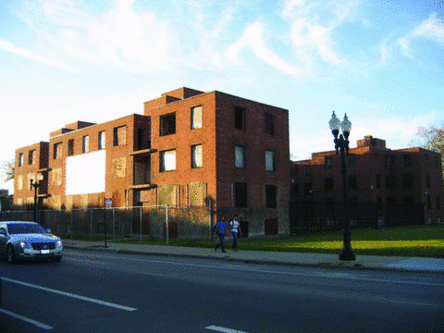SCA is proud to award the 2013 annual Cultural Horizons Prize to Catherine Fennell (Columbia University) for her article, “The Museum of Resilience: Raising a Sympathetic Public in Postwelfare Chicago," Cultural Anthropology 27, no. 4 (November 2012): 641–66.
This year's doctoral student jury, consisting of Zhiying Ma (University of Chicago), Lisa Poggiali (Stanford University), and Janell Rothenberg (UCLA), writes:
Fennell’s article is a nuanced and ethnographically rich portrait of an emergent “sympathetic public” in a “post-welfare” American city, one that congeals in and through citizens’ emotional engagements with some of the most vulnerable of urban infrastructures: public housing projects. Fennell traces this public as it forms in the process of developing the National Public Housing Museum in Chicago, a project of memorializing the resilience of the urban poor. Fennell shows how this process evokes the failed material promises of the welfare state while simultaneously revealing all the poverty, decay, and racial exclusion of the post-Fordist present. We find it no coincidence that the field for this subtle ethnography of actually existing neoliberalism should be the same Chicago where we gather this year to interrogate “future publics, current engagements,” in the debris of an urban laboratory for so many experiments in building and breaking the U.S. welfare state.

Fennell builds her theory of the sympathetic public on the work of James Frazer and Théodule Ribot, focusing on the significance of place and the alignment of proximate entities in the production of moral obligations across social groups separated by inequities of class and race. In bringing a “materialist understanding of sympathy" to bear on the question of “how citizens learn the obligations of belonging to a polity no longer able to guarantee them basic forms of protection,” she pushes us to examine the conditional and contingent characteristics of public formation. Fennell carefully and wisely anchors this analysis on the condition and cultivation of vulnerability, showing how “pleasures of vulnerability” become “the emerging grounds of inclusion within postwelfare polities.” She acutely observes and clearly documents how an embodied sense of vulnerability is curated and made “contagious” through material practices, dialogical positioning, and affective realignment. This materially mediated public formation is also a process of racialization, which “simultaneously foregrounded bitter racial divides and leveraged them into an [white middle-class’s] appreciation for human vulnerability.”
Fennell’s article is a great example of the ways in which clear, evocative writing and deeply engaged ethnography can lead to wholly original theoretical conclusions, and make us think differently about established bodies of anthropological thought such as affect, publics, infrastructure, neoliberalism, and vulnerability. By addressing polities that are no longer able to guarantee citizens basic protection, in which we feel—and we learn to feel—“on edge, constantly,” this article powerfully reveals a much broader world of decay, an ever expanding cultural horizon. Additionally, her work brings clarity to emergent social, political, and ethical configurations, and thus speaks to the importance of bringing anthropological perspectives to bear on politically salient issues of our time. For these reasons, we are pleased to award her the 2013 Cultural Horizons Prize.
The Cultural Horizons Prize is awared annually at the meeting of the American Anthropological Association and carries a honorarium of $500.